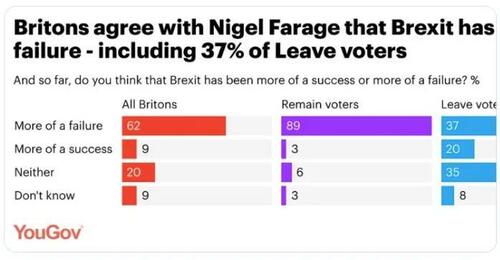
Authored by Mike Shedlock via MishTalk.com,
The Atlantic says "Britain is now paying the price for its decision to leave the European Union." I take the other side...
A friend of mine emailed an article on Brexit by The Atlantic, ‘We’re All Worse Off’ (paywalled).
The Irish News reports Just 9% of Britons say Brexit more of a success than failure, poll suggests
Nigel Farage has said that Brexit has been a failure - 62% of Britons tend to agree
— YouGov (@YouGov) May 22, 2023
% saying Brexit has been…
All Britons
More of a failure: 62%
More of a success: 9%
Neither: 20%
Leave voters
More of a failure: 37%
More of a success: 20%
Neither: 35%https://t.co/vsxKByczLu pic.twitter.com/DoqbQ5W5pu
Perception vs Reality
I responded to my friend that failure is a perception because Britain did none of the things to make Brexit work.
Consider UK policy after Brexit: No tax cuts, no trade deal with the US or China, No dismantling of inept EU rules and regulations, no progress on things like artificial intelligence or energy.
This is not a failure of Brexit, it is a failure to take advantage of things possible without being tied to the EU.
Sunrise
A few days after I emailed my friend, Eurointelligence, admitted in an article called "Sunrise" that my view is the correct one.
It was always nonsensical to replace the entire volume of some 4000 EU regulations on a single day. The majority are unproblematic. The intellectual and operational difficulty with Brexit is to select specific areas where regulatory divergence makes sense. We all know about the costs of Brexit are transparent, but the opportunities are hidden, and dependent on how well this divergence is managed.
As Joël Reland from the UK in a Changing Europe think tank explains, there are still 600 EU regulations that will be changed. What will also change is the end of the supremacy of EU law by the end of the year. UK courts will then be able to override EU law. We expect this alone to lead to significant divergence down the road. The government has also given itself fast-track authority on future changes.
But the most important aspect is that this reform is now going hand-in-hand with another initiative that is running in parallel: the pro-innovation regulation of technologies review, led by Patrick Vallance, the UK government’s former chief scientific adviser. The review is finally doing what we had urged the UK government to do right after Brexit, which is spot high-tech opportunities the EU is missing. Artificial intelligence is an obvious one, as is medical research and many other tech developments held back by the EU’s antediluvian data protection regulation. On high-tech industries, the EU has entered a regulatory death spiral, focused entirely on consumers since the EU companies no longer have skin in the game.
The EU’s problems with these industries has been building up over the last 20 years. Innovation and entrepreneurship have fallen down the ladder of political priorities. We also have doubts about the efficacy of Horizon EU, the EU’s research programme. It is large in volume, and a bureaucratic nightmare, according to this survey. But apart from the cumbersome application process, one has to question why it is that the race for several cutting-edge 21st century technologies is nowadays mainly between the US and China.
We don’t see the UK so much as a threat to the EU in the way Emmanuel Macron and Michel Barnier had imagined, through low-wage sweatshops. The UK will simply exploit areas the EU has left to others.
We expect the UK’s shift in technology focus and regulations to persist under a Labour government. Labour will reap the benefits from what now appears the start of a post-Brexit strategy. Once you have spotted opportunities for investment and drawn in investors, you are not going to reverse to a status-quo ante.
Some See Failure, Others See Sunrise
The headless Atlantic misses the inevitable opportunities that will come into play sooner or later simply because the EU is so inept.
Interestingly, Eurointelligence was one of the biggest supporters of the EU that one could find.
Increasingly, it has very negative articles on Germany regarding cars, energy policy, Russia, and China.
Specifically, Germany is looking back, trying to protect dying industries and even needing more coal to do so.
In general, EU nannycrats are still trying to punish Google, Microsoft, and US technology companies. It take unanimous consent of 27 countries to do much of anything so its focus on AI is to throw up roadblocks.
Yep, the Tories totally blew the aftermath of Brexit. But those are policy errors that do not make Brexit unwise.
The UK would be crazy to want back in the EU.
Fortunately, "Once you have spotted opportunities for investment and drawn in investors, you are not going to reverse to a status-quo ante."
Indeed. Kissing the EU goodbye was a very wise decision, it will just take longer than expected for that to become obvious.
Bring on sunrise.
Artificial Intelligence Will Progress
In Time Magazine. Eliezer Yudkowsky, a US Decision theorist, proposes a total ban on AI because "If we go ahead on this everyone will die". He would preemptively strike all AI data centers.
Yudkowsky belongs in the EU.
For discussion, please see To Stop AI, Lunatics Are Willing to Risk a Global Nuclear War
* * *
Like these reports? I hope so, and if you do, please Subscribe to MishTalk Email Alerts.
Authored by Mike Shedlock via MishTalk.com,
The Atlantic says “Britain is now paying the price for its decision to leave the European Union.” I take the other side…
A friend of mine emailed an article on Brexit by The Atlantic, ‘We’re All Worse Off’ (paywalled).
The Irish News reports Just 9% of Britons say Brexit more of a success than failure, poll suggests
Nigel Farage has said that Brexit has been a failure – 62% of Britons tend to agree
% saying Brexit has been…
All Britons
More of a failure: 62%
More of a success: 9%
Neither: 20%Leave voters
More of a failure: 37%
More of a success: 20%
Neither: 35%https://t.co/vsxKByczLu pic.twitter.com/DoqbQ5W5pu— YouGov (@YouGov) May 22, 2023
Perception vs Reality
I responded to my friend that failure is a perception because Britain did none of the things to make Brexit work.
Consider UK policy after Brexit: No tax cuts, no trade deal with the US or China, No dismantling of inept EU rules and regulations, no progress on things like artificial intelligence or energy.
This is not a failure of Brexit, it is a failure to take advantage of things possible without being tied to the EU.
Sunrise
A few days after I emailed my friend, Eurointelligence, admitted in an article called “Sunrise” that my view is the correct one.
It was always nonsensical to replace the entire volume of some 4000 EU regulations on a single day. The majority are unproblematic. The intellectual and operational difficulty with Brexit is to select specific areas where regulatory divergence makes sense. We all know about the costs of Brexit are transparent, but the opportunities are hidden, and dependent on how well this divergence is managed.
As Joël Reland from the UK in a Changing Europe think tank explains, there are still 600 EU regulations that will be changed. What will also change is the end of the supremacy of EU law by the end of the year. UK courts will then be able to override EU law. We expect this alone to lead to significant divergence down the road. The government has also given itself fast-track authority on future changes.
But the most important aspect is that this reform is now going hand-in-hand with another initiative that is running in parallel: the pro-innovation regulation of technologies review, led by Patrick Vallance, the UK government’s former chief scientific adviser. The review is finally doing what we had urged the UK government to do right after Brexit, which is spot high-tech opportunities the EU is missing. Artificial intelligence is an obvious one, as is medical research and many other tech developments held back by the EU’s antediluvian data protection regulation. On high-tech industries, the EU has entered a regulatory death spiral, focused entirely on consumers since the EU companies no longer have skin in the game.
The EU’s problems with these industries has been building up over the last 20 years. Innovation and entrepreneurship have fallen down the ladder of political priorities. We also have doubts about the efficacy of Horizon EU, the EU’s research programme. It is large in volume, and a bureaucratic nightmare, according to this survey. But apart from the cumbersome application process, one has to question why it is that the race for several cutting-edge 21st century technologies is nowadays mainly between the US and China.
We don’t see the UK so much as a threat to the EU in the way Emmanuel Macron and Michel Barnier had imagined, through low-wage sweatshops. The UK will simply exploit areas the EU has left to others.
We expect the UK’s shift in technology focus and regulations to persist under a Labour government. Labour will reap the benefits from what now appears the start of a post-Brexit strategy. Once you have spotted opportunities for investment and drawn in investors, you are not going to reverse to a status-quo ante.
Some See Failure, Others See Sunrise
The headless Atlantic misses the inevitable opportunities that will come into play sooner or later simply because the EU is so inept.
Interestingly, Eurointelligence was one of the biggest supporters of the EU that one could find.
Increasingly, it has very negative articles on Germany regarding cars, energy policy, Russia, and China.
Specifically, Germany is looking back, trying to protect dying industries and even needing more coal to do so.
In general, EU nannycrats are still trying to punish Google, Microsoft, and US technology companies. It take unanimous consent of 27 countries to do much of anything so its focus on AI is to throw up roadblocks.
Yep, the Tories totally blew the aftermath of Brexit. But those are policy errors that do not make Brexit unwise.
The UK would be crazy to want back in the EU.
Fortunately, “Once you have spotted opportunities for investment and drawn in investors, you are not going to reverse to a status-quo ante.”
Indeed. Kissing the EU goodbye was a very wise decision, it will just take longer than expected for that to become obvious.
Bring on sunrise.
Artificial Intelligence Will Progress
In Time Magazine. Eliezer Yudkowsky, a US Decision theorist, proposes a total ban on AI because “If we go ahead on this everyone will die”. He would preemptively strike all AI data centers.
Yudkowsky belongs in the EU.
For discussion, please see To Stop AI, Lunatics Are Willing to Risk a Global Nuclear War
* * *
Like these reports? I hope so, and if you do, please Subscribe to MishTalk Email Alerts.
Loading…




